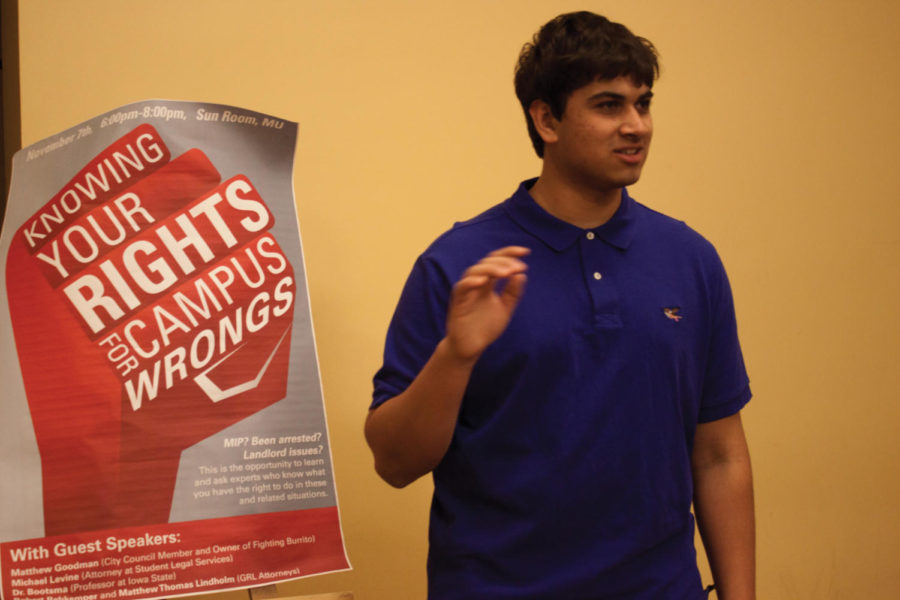Knowing your rights for campus wrongs
November 8, 2012
In the Knowing Your Rights for Campus Wrongs seminar on Wednesday, the four panelists focused on citizens’ rights in city regulations, criminal defense, drug charges, drunk driving defense and landlord-tenant problems.
The panelists were Matthew Goodman, city council member and an ISU alumnus who is a part owner of Fighting Burrito, Mike Bootsma, lecturer of accounting at Iowa State, Michael Levine, attorney for ISU Student Legal Services, and Matt Lindholm, attorney in the Law Offices of Gourley, Rehkemper & Lindholm.
“What I find to be the most interesting about city government is that I don’t know that everyone understands how they’re being defended or abused, depending on the circumstance,” Goodman said. “And I think students often times are a big part of abuse piece.”
Goodman stressed how being actively involved with local city government by voting can help to prevent some of these abuses of power. Taxes and rent costs are also dependent on city council decisions. “The idea of cost is something that someone decides for you, so how much you pay, how we build this community and ask you to pay for it, six people really decide — City Council,” Goodman said.
Bootsma followed with an explanation of the Iowa Code 562A, which entails Iowa landlord and tenant law.
“Landlords need to give 24-hour notice if they plan to enter your apartment,” Bootsma said. “There is legal action you can take if they do not give you notice.”
In regard to delinquent rent, Iowa law requires a landlord provide three days notice. After that, the landlord then can file for an eviction, which occurs no earlier than seven days.
“Take pictures of your apartment, and ask for a sheet to write down what was wrong with the space before you move in,” Bootsma added to his list of advice.
All renters involved should take time to slowly read the entire written contract, added Levine. “You really need to think about long and hard about who you’re renting with. If everybody else bails on you on that lease, you’re responsible for the others, and that’s a really critical concept.”
Lindholm ended the panel with a transition into legal rights regarding drug and drunk driving charges.
Lindholm had a volunteer interact with him in a conversation an officer might have with an intoxicated driver. He asked the volunteer if he had been drinking and if he would take a field sobriety test. The volunteer admitted to drinking, for the sake of the example, and agreed to take the test.
“You never want to admit something to a cop,” Lindholm said after the scenario. “As soon as you admit to drinking, you have slurred speech, watery, bloodshot eyes, and you smell of alcohol.”
Additionally, in Iowa there is no penalty for not taking the field sobriety test. “You’re probably going to get arrested and taken to the station, but you haven’t given the cop evidence at that point,” Lindholm said.
Lindholm said that arrested individuals are generally given an hour to make phone calls, and he said to use that hour. An hour later, your blood-alcohol level will not be as high.
“You also have the right for an attorney or family member to come meet you in the station,” Lindholm said. “If you take the breath test, and they have violated your right to have a family member there, they can’t use it as evidence in court.”
If you’re from out of state, Lindholm suggested having the number of a local attorney available.

















